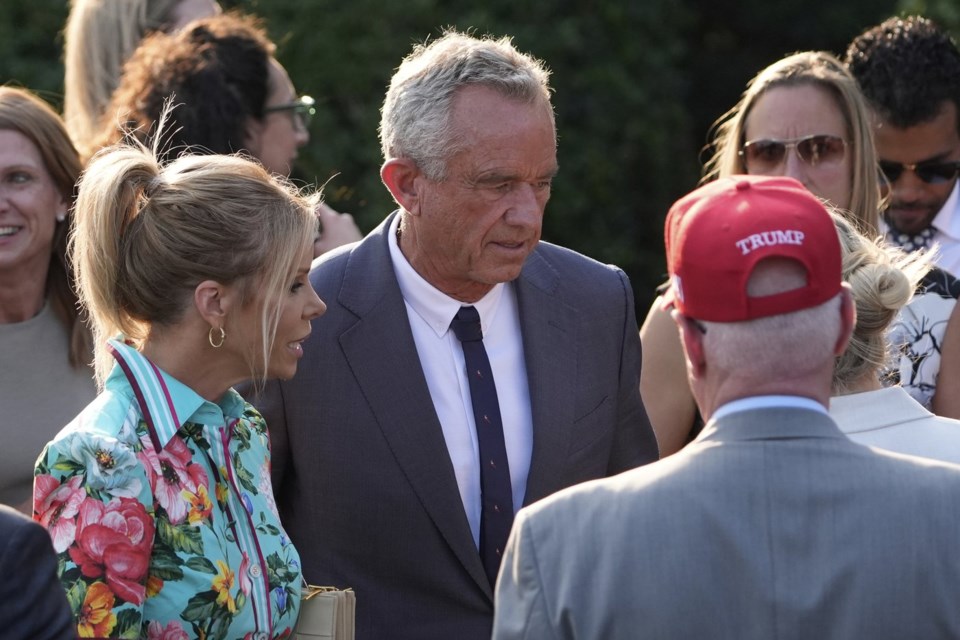TORONTO — Canadian doctors and scientists say Robert F. Kennedy Jr.'s firing of an immunization advisory committee south of the border could bolster anti-vaccine sentiment in Canada.
Angela Rasmussen, a virologist at the University of Saskatchewan, said she fears efforts by the longtime anti-vaccine advocate to replace the members of the U.S. scientific group will foster more false and harmful beliefs, not only in the United States but also in Canada.
"It creates a culture in which anti-vaxx beliefs are more accepted and challenged a lot less. And also it creates an environment where there's an alternative to an evidence-based recommendation framework," she said Tuesday.
Kennedy, the U.S. health and human services secretary, said Monday he will appoint new members to the Advisory Committee on Immunization Practices, which advises the Centers for Disease Control and Prevention about vaccination.
Even though Kennedy's new appointments will make vaccine recommendations specific to the United States, any disinformation could also feed vaccine hesitancy among Canadians, Rasmussen said.
"We have a lot of the same anti-vaxx sentiment up here. Certainly this will at the very least empower (that)," she said.
Rasmussen linked the current measles outbreaks in both countries to disinformation that leads to parents not immunizing their children against preventable diseases.
She said Canada could also face vaccine shortages if the new committee pulls back vaccination recommendations and manufacturers cut back on production.
"There's a lot of potential for really, really damaging vaccine access throughout the U.S. and potentially around the world because the U.S. market has a big impact on what vaccine manufacturers are actually going to make and manufacture," she said.
"There's so many ways that this can end up really badly for vaccination in general. And it really causes me a lot of concern."
Maxwell Smith, a bioethicist at Western University in London, Ont., said the U.S. immunization advisory committee has been a "global leader" in evaluating and making recommendations on vaccines and a useful resource for other countries, including Canada's National Advisory Committee on Immunization (NACI).
"The United States is a powerhouse when it comes to science policy, vaccine policy," he said.
"Now it's going to be very difficult to look to the United States for for any sort of insight (on immunization)."
Rasmussen said the firing of the advisory committee members is just the latest in a series of anti-public health actions Kennedy has taken.
"It's a death by a thousand cuts," said Rasmussen, who is American and moved to Canada during the pandemic to work at the University of Saskatchewan's Vaccine and Infectious Disease Organization.
U.S. President Donald Trump's administration has already cut billions of dollars in research grants at the National Institutes of Health.
In May, the administration cancelled a contract with mRNA vaccine manufacturer Moderna to develop a vaccine against potential pandemic influenza viruses, including H5N1 avian flu.
"It just seems that there is a top-down approach that views mRNA vaccines in particular — vaccination in general, but mRNA vaccines in particular — with distrust and is trying to dismantle that particular avenue of medical research," said Dr. Jesse Papenburg, a pediatric infectious diseases specialist at Montreal Children's Hospital.
Papenburg, who is a member of NACI but was not speaking on its behalf, said although the Moderna contract cancellation and the firing of the U.S. immunization advisory committee members are two separate actions, they're both concerning as Canada tries to prepare for potential human-to-human transmission of H5N1.
"Both are potentially very dangerous when it comes to America's and the world's ability to respond to emerging infectious diseases for which vaccines could be a useful medical countermeasure," he said.
The Public Health Agency of Canada said Wednesday that it works with Health Canada to ensure that guidance to Canadians is "based on the best available scientific evidence."
"Our work is focused on: research to better understand and respond to misinformation and disinformation, debunking and pre-bunking false or misleading information, community and partner engagement, and improving how we communicate public health risks and the science that underpins our health guidance," the agency said in an emailed statement.
— With files from The Associated Press
This report by The Canadian Press was first published June 11, 2025.
Canadian Press health coverage receives support through a partnership with the Canadian Medical Association. CP is solely responsible for this content.
Nicole Ireland, The Canadian Press




